
The Fate of Satoshi's Vision: A Fork of a Fork of a Fork and an Appeal to the Law.
May 8, 2019, 8:56PM by Martin Banov
by Martin Banov
Decisive steps have been taken against BSV (Bitcoin Satoshi Vision), Craig Wright, and Calvin Ayre after the community decided it has had enough.
Bitcoin SV (Satoshi's Vision), the latest schism in the taxonomy of Bitcoin hard forks was recently delisted from Binance, the leading crypto exchange by volume, on the basis of crossing a certain line or -- as officially announced, not meeting the exchange's specified standards of what they are willing to accept and deal with on their platform. Kraken and Shapeshift followed suit shortly after, plunging the price of BSV in the midst of heated Twitter exchanges (see hashtag #DelistBSV).
To provide some background and context to the situation, BSV was a Bitcoin Cash (BCH) hard fork that took place after a November 15, 2018 network upgrade which resulted in Bitcoin ABC (standing for Adjustable Blocksize Cap) and Bitcoin SV ("Satoshi's Vision"), the former backed by Roger Ver, Jihan Wu, and people such as Cornell Prof. Emin Gün Sirer, while the latter represented by notorious crypto pariah Craig Wright and nouveau riche billionaire Calvin Ayre. One of the main differences between the two forks is the increased block size, with ABC bumping it up to 32 MB and SV going for a default block size of 128 MB, which has important implications for the mining industry politics, since bigger blocks tend to benefit bigger miners (also see "selfish mining").
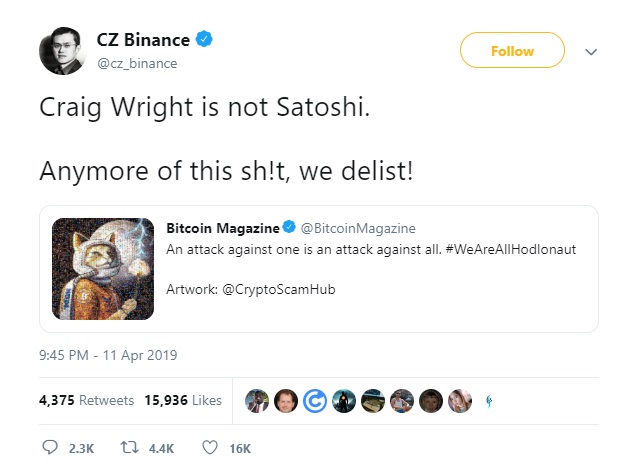
In short, ABC went for implementing opcodes that aim to increase functionality, allowing for verifying data in non-transaction messages, such as input from a trusted external data source or "oracles", thereby enabling a limited range of contracts-like applications. Additionally, in the suggested model, ABC wants to allow node operators to set the maximum block size they want to process, gradually removing the block size entirely but starting at 32 MB. Lastly, the people behind the ABC fork are in favor of implementing the Canonical Transaction Ordering Rule (CTOR) -- ordering transactions by their ID, instead of the Topological Transaction Ordering (TTOR), where if spending a UTXO within the same block, the spending transaction must come after the transaction whose outputs are spent, while all other transactions spending from transactions in previous blocks may appear in any order.
As is always the case with anything that involves extending the core Bitcoin protocol with anything fancier than a basic calculator keeping track of what's been spent and minted, some community members (mostly miners, as the SV version appears to favor their interests) took the side of SV, which is developed by nChain, Wright and Ayre's research company (Sirer commented in an interview on the team's incompetence and how they couldn't fork off without help from the BCH crowd). The fork was followed by a consequent hash war between the rivalry chains with things going as far as dedicating an entire mining pool ("sharkpool") to mining empty blocks on ABC and other networks and selling the proceeds for what they consider to be the "true vision" of Bitcoin.
And for some further details about Ayre's background (since one couldn't help but wonder, given the nature of his tweets), he became a billionaire in the 2000's, amassing his fortune from his online gambling business, having gotten involved with cryptocurrency in the momentum of the 2017 pumpathon at the height of the Bitcoin craze, when he also acquired cryptocurrency news site CoinGeek. He has also thrown substantial funding at Bitcoin Cash (BCH) and its mining operations, but went on to throw the weight of his reputation and money in support of BSV and Wright in November 2018.
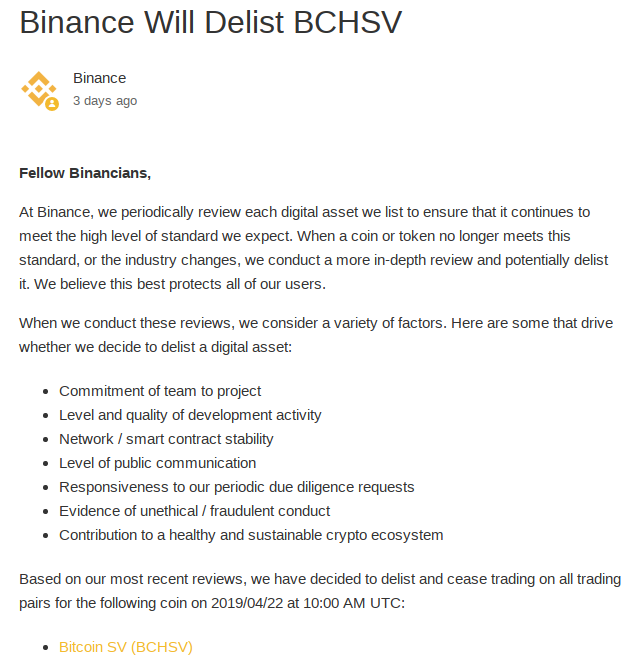
The deplatforming of BSV brings closer to its conclusion an almost year-long chronicle of the familiar Bitcoin adversities, vitriol and nonsense Twitter theatrics that traditionally accompany Bitcoin anything. Although having a small group of dissenting supporters, Wright has been widely denounced by many in the industry as an incompetent fraud, including eventually Binance CEO Changpeng Zhao. The move to finally pull the plug on BSV took place after Wright and Ayre's persistent bullying and legal threats directed at anybody daring to criticize them ultimately crossed the line when Wright placed a bounty on the identity of Twitter user "hodlnaut" for claiming that he (Wright) is not Satoshi (and therefore, a charlatan).
Hodlnaut: The Last Straw
Hodlnaut has not been the only target of Wright’s noxious behavior and never-ending legal threats. Wright has sent cease-and-desist letters to other individuals such as Peter McCormack for also openly not buying into his Satoshi claims. (For those that may for some reason be unaware, a common monicker of Wright's is "Faketoshi", a title he earned after an attempt to present himself the anonymous deus otiosus of Bitcoin's primitive crypto-hawala and cyber-libertarian prophet of the blockchain hype, the mysterious Satoshi Nakamoto.) The following #WeAreAllHodlnaut social campaign is what finally led to exchanges taking action.
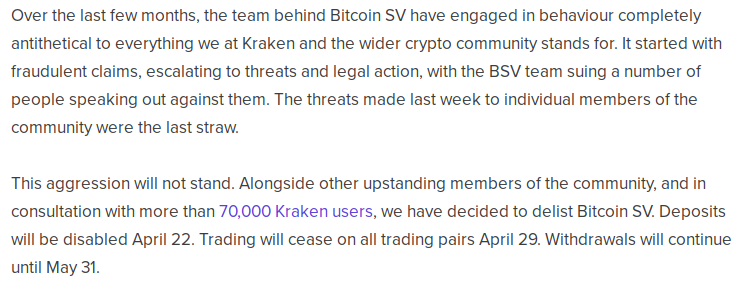
Legal threats, lawsuits, and patent claims seem to be a Craig Wright trademark, usually complemented by his demonstrative arrogance (e.g., constantly bragging how he has "more master's degrees than he can count", proclaiming in front of an audience in Rwanda at an Africa Summit in 2018 that he's "got more money than your country" and other such similar examples of cringe-worthy public embarrassment), and a kind of self-centered narcissistic victimhood. Some say that his BSV fork had been listed on exchanges largely under pressure from lawsuits to begin with, which seems plausible, given everything else and no matter how "libertarian" a resort among communities built around self-regulating cultures and the notion of autonomous spaces of self-institutionalized governance.
"I've got more money than your country, trust me."
- Craig Wright, speaking in front of an audience in Rwanda.
Alas, Wright's obnoxious attitude and egocentric character isn't really an exception in the crypto space, even if he may be one of the most outstanding embodiments of some of the worst tendencies which the earlier blockchain hype of "lambos and moons" inevitably attracted, before more seriously coming to the attention of academia and a broader range of institutions, large companies, and businesses.
Vitalik Buterin and Joseph Poon's outrage at Wright's presence at the Deconomy Conference.

Crypto Reality TV Sensationalism: McAfee vs. Ayre
Around the same time as BSV's defenestration, even John McAfee stepped in to criticize Calvin Ayre after Ayre tweeted this:
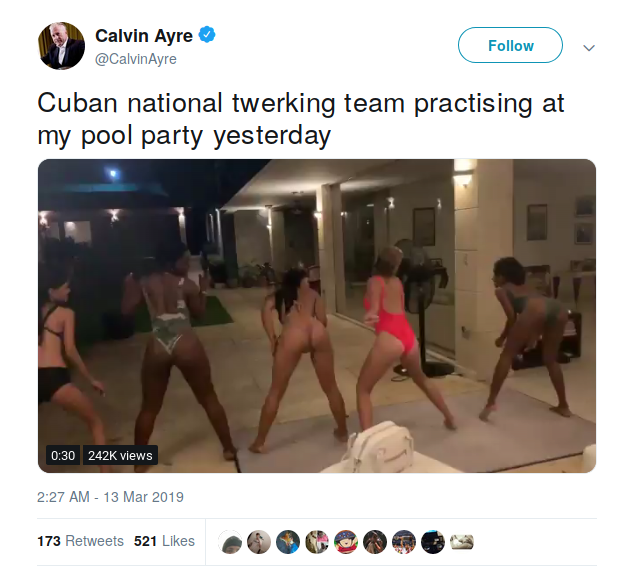
As one might imagine, Ayre's tweet irritated and outraged many in a community supposedly dedicated to advancing scientific and technological innovation to make the world a better place. While he is better-known than anyone in the crypto space for pushing the sleeze envelope, John McAfee called Ayre out:
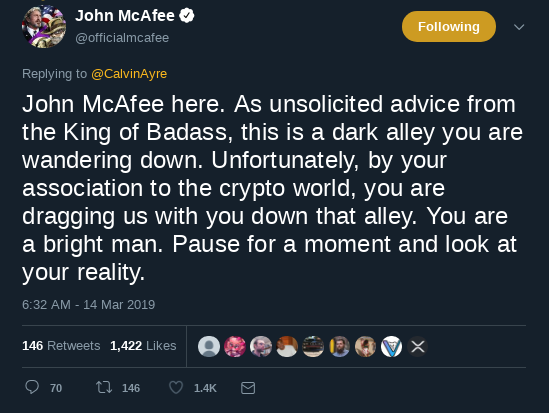
And Emin Gün Sirer then said what was undoubtedly on everyone's mind:
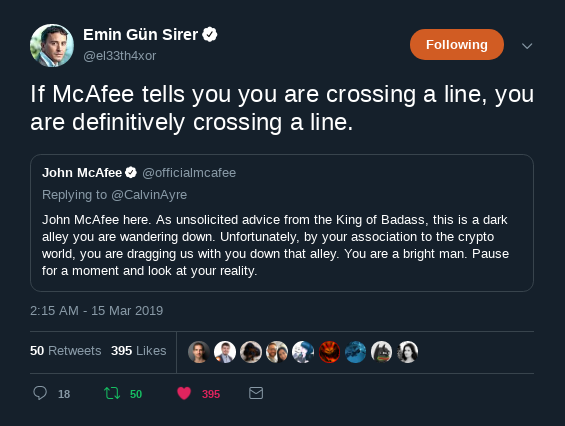
A post titled "You’re heading down a dark alley, John McAfee warns Calvin Ayre", which first appeared on Coin Rivet has now been taken down. It is said that the post implied that Ayre was “guilty of child abuse offenses”, which the publication later claimed to be "untrue", going on to remove all articles that made any reference to the issue, both on their website and social media. Additionally, the publication has agreed to pay Ayre libel for “substantial damages caused” as well as issuing a “statement to the English High Court in settlement of Mr. Ayre’s complaint.”
In response to Ayre's attack on Coin Rivet, McAfee joined a wave of opposition against the BSV camp, saying that he had already sued Ayre in “four different countries.” If true, this would mean Ayre would have to retain legal teams in each of these countries to hold off the charges. Furthermore, McAfee added that he has attorneys on retainer in 17 countries, hence, more lawsuits could be expected.
CoinRivet sued by Calvin Ayre. I'm suing Calvin for $800 mil. Calvin stated that I committed murder. Completely unsubstantiable. Cuba is a Civil Law country - making lawsuits diffucult. However, I traced his assets to other countries. I will bankrupt him. https://t.co/BubOuoZLxI
— John McAfee (@officialmcafee) April 13, 2019
And so, while many people, like those in Venezuela or elsewhere in the mass of "unbanked around the world" are struggling to survive on a daily basis, we continue to witness the reality show of "millionaire philanthropists" burning through piles of money to pay armies of lawyers for the most senseless of reasons. For BSV, given their adoption of "sue you til ruin" tactics befitting Scientology, the lawsuits might end up being a necessary sacrifice. It's not their money anyway, right? It's the money of the fools who gave it to them.
There is also talk that BSV might go ahead and launch their own exchange which, given their reputation for questionable motives would be more than a bit fishy. While in principle this would make it much easier for BSV to manipulate market prices and skew the market to aid their agenda (or rather whims, since there doesn't quite appear to be a coherent "vision" at "Satoshi's Vision), it seems that the exchange plan is much more about ego, and the delusional belief that they can provide a unique service.
To make all this an even juicier spectacle, bear in mind that McAfee is a future candidate for the US presidency, a fact which befits his own opportunism and delusion. Granted, McAfee has the finesse to handle the situations he gets himself in a whole lot more intelligently and thoughtfully than the likes of Ayre or Wright.
The famous McAfee "How to Uninstall McAfee Antivirus" piece.
Some have defended the BSV camp as proponents of censorship resistance in the face of dictatorial decisions by the individuals running major centralized exchanges like Kraken and Binance. This makes sense given the enormous power and influence these exchanges wield over market dynamics, as well as a whole host of other infectious problems which, paradoxically, crypto-technologies were supposed to resolve or at least oppose and resist. Wright and Ayre are then defenders of a particular kind of freedom. This may be so, in some sense, but in response, I feel ironically tempted to quote Joseph Stalin:
"Yes, freedom, but freedom for whom, and to do what?"

Additional Reads on the Subject
Vitalik Buterin on free speech. In which he concretizes the scope of the precedent and discusses the spaces in which different forms of behavior are acceptable. (And here I would add that many people seem to not understand that there is a difference between public space and private space, between public life and private life, between the agora and the oikos.)
An /r/btc post and thread with the collected "works" of Craig Wright (examples of sloppy academic plagiarism, forgery, etc.).
The original Bitcoin white paper, which BSV claims as its own. This is perhaps a good time to revisit it and to decide if it could have been thought up or written by Craig Wright. To me pretty proves Wright as anything but Satoshi and that, as McCormack has pointed out, "the irony is that nobody else [than Wright] has done so much to prove he ISN'T Satoshi."
Disclaimer: information contained herein is provided without considering your personal circumstances, therefore should not be construed as financial advice, investment recommendation or an offer of, or solicitation for, any transactions in cryptocurrencies.

















